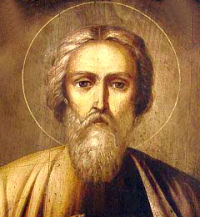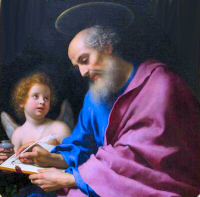He got up and followed him. (Matthew 9:9)
Matthew was one of those Jews who worked for the Roman occupation forces in Palestine. Often corrupt and unjust, tax collectors were known to cheat their own people, lining their pockets with the extra money they collected. Regarded as a traitor by his fellow Jews, Matthew was placed in the same category as prostitutes and other public sinners.
But all of this changed when Matthew answered Jesus’ call. Over time, he underwent a profound conversion and became a powerful evangelist. He devoted himself to bringing the gospel message to the same Jews he had once alienated and scandalized. Even today, his preaching continues to touch hearts through the Gospel that bears his name.
It’s interesting that today’s Gospel reading pairs Matthew with the Pharisees who, though more faithful to Judaism, nonetheless struggled to accept Jesus’ teachings. Jesus knew how devoted they were, but he still urged them to go further by stretching their conception of mercy and compassion. In a sense, Jesus was issuing the same call to the Pharisees as he did to Matthew: “Follow me” (Matthew 9:9).
Clearly, holiness is not just a choice that we make one time, such as when we are confirmed or decide to attend Mass regularly. If Jesus was urging even the religious leaders to deepen their faith, why should we think he wouldn’t be calling us farther along?
There is no end to the call to holiness—at least not in this life. That’s not because we’re so hopelessly sinful. No, the call never ends because our lives keep changing. A young man starting out in life will face far different challenges than a much older man facing retirement. A mother of young children will have a different path of holiness than a grandmother living by herself in a nursing home. Matthew’s decision to follow Jesus as a new disciple was far different from his decision to follow Jesus as a Spirit-filled apostle—or as a wise pastor for that matter.
How is Jesus calling you to follow him? What are the next steps he is asking you to take along the path to holiness?
“Lord, I want to follow you with the same passion as Matthew did. Let my life be a witness to you.”
Ephesians 4:1-7, 11-13; Psalm 19:2-5

 St. Matthew is known to us principally as an Evangelist, with his Gospel being the first in the New Testament. His Gospel was written in Aramaic, the language that our Lord Himself spoke and was written to convince the Jews that their anticipated Messiah had come in the person of Jesus.
St. Matthew is known to us principally as an Evangelist, with his Gospel being the first in the New Testament. His Gospel was written in Aramaic, the language that our Lord Himself spoke and was written to convince the Jews that their anticipated Messiah had come in the person of Jesus.